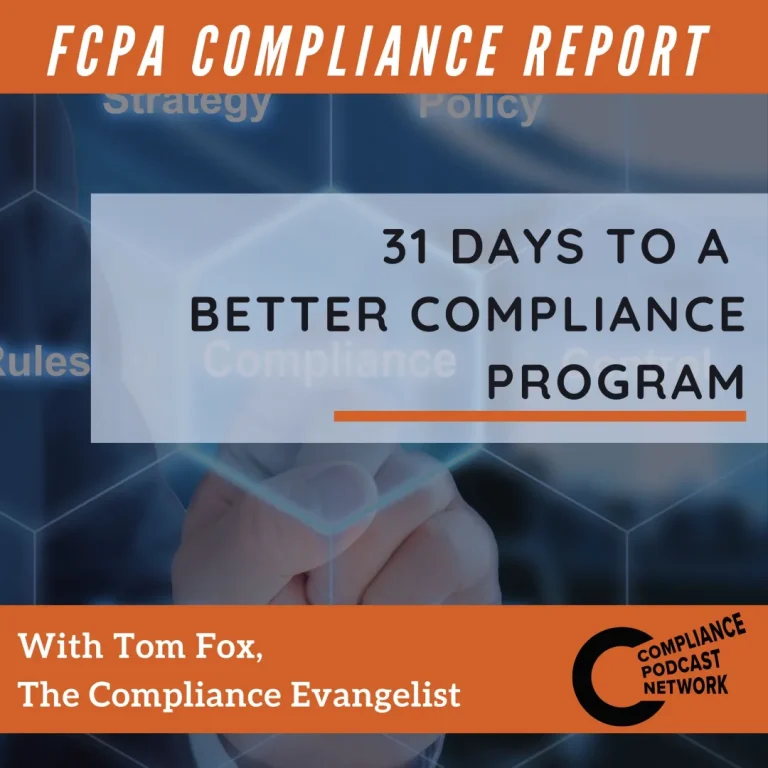In this podcast episode, Tom Fox highlights the importance of incorporating compensation systems into a company’s compliance program. He discusses how the DOJ and SEC view monetary structures as a way to reinforce compliance and reward employees who adhere to compliance programs. Fox advises compliance practitioners to revise incentive systems to align with the goals of the compliance program, ensuring simplicity, alignment with company values, and immediate behavior change. He also emphasizes the need to align compensation programs with compliance goals and shares examples of how this can be done effectively. These episodes provide valuable insights into the role of compensation in promoting compliance and integrating compliance into HR practices, emphasizing the importance of transparency and immediate action in implementing effective compensation structures for compliance.
When it comes to compliance programs, many companies focus primarily on policies, procedures, and training. However, designing a compensation system that reinforces compliance is equally crucial. According to the Department of Justice (DOJ) and the Securities and Exchange Commission (SEC), rewarding employees who conduct business in compliance with their employers’ programs is an effective way to promote compliance.
- Incorporating Compliance Incentives:
To align your compensation system with your compliance program, consider revising your incentive structure. Fox advises compliance practitioners to ask themselves three key questions: Is it simple? Is it aligned with company values? Does it affect behavior immediately?
Keeping the compensation plan simple is essential to prevent employees from reverting to old, non-compliant behaviors. By aligning the goals of compliance practitioners with the entity’s compliance goals, you can ensure that the compensation program effectively drives desired behaviors.
2. The Impact of Sales Compensation:
Salespeople often generate the majority of a company’s revenue, making their alignment with compliance goals crucial. Immediate implementation of incentive structures is important, but it should also incentivize employees to support compliance initiatives. Transparent communication with employees or third-party sales bases is necessary for effective implementation.
3. Transparency and Accountability:
Transparency plays a vital role in gaining acceptance for compliance initiatives. While designing the incentive system may not be a democratic process, openness is essential. Employees should appreciate the transparency in the compensation structure, leading to accountability and their acceptance of compliance goals.
4. Integrating Compliance Incentives:
The podcast suggests incorporating compliance incentives into the compensation program. Even a small percentage of a discretionary bonus can be significant to employees. For example, a discretionary bonus program based on overall sales can be a starting point for incorporating compliance incentives. Fox recommends allocating 5-10-20% of the discretionary bonus program towards compliance incentives.
5. The Role of HR in a Fully Operationalized Compliance Program:
To fully operationalize compliance, it is essential to integrate compliance into HR practices. HR can play a crucial role in ensuring transparency, simplicity, and alignment of the compensation structure with company values. By making compliance part of the incentive structure, employees will understand and support the evolving business model and strategy of the organization.
As compliance practitioners, it is our responsibility to prioritize integrity, ethics, and compliance within our organizations. Incorporating compensation systems into our compliance programs is a powerful tool in driving desired behaviors. By aligning our incentive structures with compliance goals, keeping them simple, and fostering transparency, we can create a culture of accountability and acceptance.
Three key takeaways:
- The DOJ and SEC have long advocated compensation to motivate employees into ethical and compliant behaviors.
- Keep the compliance aspects of your compensation structure simple and easy for your employees to understand.
- Have full transparency in the frame of your compensation structure.
For more information, check out The Compliance Handbook, 4th edition, available on LexisNexis.com.



